
top of the heap to third world status in one generation
- Thread starter Thread starter Gry
- Start date Start date
Porky82
Well-known member
That's a good read. Shame it's true too!
The War on Wisdom: How the GOP Made Smart Uncool
Why Republicans Fear Critical Thinking, Science, and Equality.hartmannreport.com
Capitalism wouldn't function for the elite if people were smart enough to realise they are getting used! I watched something a while ago that one of the states could only afford to open schools 4 days a week but was producing billions of dollars of crude oil yearly.
Eltitoguay
Well-known member
UNDERGROUND POLITICS :
POLÍTICA DE BAJOS FONDOS :
Un protagonista confiesa que la campaña de Reagan saboteó a Carter en la crisis de los rehenes :
Ben Barnes, prominente político, desvela que viajó a Oriente Medio para abortar la llamada "sorpresa de octubre" y que Irán no liberara a los estadounidenses secuestrados hasta que pasaran las elecciones de 1980 :
View attachment 19123491
El expresidente estadounidense Jimmy Carter, recientemente fallecido con 100 años, cuando contaba con 98 años
Francesc Peirón
Nueva York. Corresponsal
19/03/2023
Ben Barnes, que fue figura prominente de la política estadounidense, ha querido hacer las paces con su conciencia y con la memoria histórica de uno de los presidentes más desafortunados de cuantos han pasado por la Casa Blanca.
A sus 85 años, Barnes confiesa a The New York Times un secreto guardado desde hace más de cuatro décadas y que confirma por primera vez que realmente existió la conspiración para sabotear la reelección de Carter en noviembre de 1980.
Ben Barnes (Texas politician) - Wikipedia
en.wikipedia.org
El demócrata Carter estaba en el gobierno acechado por la crisis de los rehenes en Irán, los 52 ciudadanos estadounidenses aún retenidos en la embajada de Estados Unidos en Teherán, cosa que había paralizado su mandato y le hacía parecer un perdedor.
En el equipo de campaña de su rival, el republicano Ronald Reagan, temían que días antes de las elecciones del 4 de noviembre el presidente se sacará un as de la manga y anunciara un acuerdo con el ejecutivo iraní, lo que le impulsaría de forma decisiva en las urnas.
Ahí acuñaron el término "sorpresa de octubre".
View attachment 19123494
El clérigo islamista chiita, el ayatolá Ruhollah Jomeini, encabezó la revolución islamista que derivó en la toma de rehenes estadounidenses durante 444 días
La sospecha de que hubo un complot republicano para retrasar la liberación y que Carter no pudiera jugar esa carta ha sido motivo de investigaciones y de una extensa literatura, sin resultados ni pruebas concluyentes.
Pero Barnes, en su declaraciones al periodista Peter Baker, desvela que él, que era demócrata, acompañó a su mentor político, John B. Connally jr., a un viaje por Oriente Medio. Asegura que solo después entendió que la finalidad de aquel periplo tenía el objetivo de dinamitar la campaña de reelección del presidente haciendo llegar a los ayatolá que no pactaran la liberación de los rehenes con la Casa Blanca.
Si ganaba Reagan, lograrían más ventajas en la negociación.
Al poco de regresar, Barnes sostiene que Connally informó de todos los detalles del viaje a William J. Casey, director de la campaña de Reagan y, después en su gobierno, director de la CIA.
Los colaboradores de Carter siempre sospecharon que Casey o alguien de la órbita de Reagan torpedearon secretamente cualquier negociación.
Barnes viajó con su mentor político John B. Connally jr a un viaje por Oriente medio para hacer llegar a los ayatolá que no pactaran la liberación de los rehenes
Connolly, ya fallecido, ex gobernador de Texas que había prestado servicio con tres presidentes, era un demócrata que había cambiado de chaqueta. Perdió la nominación republicana ante Reagan, pero se había decidido a prestar ayuda al gobernador de California a cambio de aspirar a un alto cargo en la nueva administración, como secretario de Estado o de Defensa.
Jamás obtuvo esa recompensa.
Sin embargo, nunca comentó nada de la operación, a pesar de que hubo comisiones para indagar el asunto del sabotaje electoral.
“La historia necesita saber que es lo que ocurrió”, afirma Barnes en el Times, al que nunca llamaron a declarar por este asunto. “Creo que es muy significativo y supongo que saber que está cerca el final para el presidente Carter lo puso en mi mente más y más y más. Sentí que tenía que explicarlo de alguna manera”, recalca.
La ruta, según la descripción de Barnes, confirmada por documentos de la biblioteca del presidente Lyndon B. Johnson, se inició en Houston (Texas) el 18 de julio de 1980. Esto les llevó a las capitales de Jordania, Siria, Líbano, Arabia Saudí, Egipto e Israel. En todas las reuniones, excepto en las del último país citado, el objetivo era hacer llegar a Teherán que mantuvieran el cautiverio. Anotaciones sobre este viaje en aquel momento lo explican como una cuestión “estrictamente privada”.
View attachment 19123498
El presidente estadounidense Lyndon B. Johnson hablando con un joven Ben Barnes en una imagen tomada en 1967
Así fue :
Los iraníes anunciaron su liberación tras la victoria de Reagan y su regreso no se produjo hasta que, el 20 de enero de 1981, Carter abandonó la Casa Blanca.
A los pocos días, el ya presidente Reagan recibió y se exhibió con algunos de los que sufrieron un cautiverio de 444 días, desde el 4 de noviembre de 1979.
En septiembre de 1980 es cuando se produjo el encuentro con Casey.
La ciudad de Madrid también juega un papel relevante puesto que Casey supuestamente se reunió en agosto de 1980 con representantes iraníes en la capital española.
Barnes insiste en que él desconocía el propósito del viaje al que le invitó Connally. Volaron en el avión de una compañía petrolera. Solo al sentarse con los líderes árabes comprendió el significado.
En su rememoración, subraya que Connally decía a esos líderes, incluido Anwar el-Sadat de Egipto: “Ronald Reagan va a salir elegido presidente y hacer llegar a Irán que tendrán mejor trato con Reagan que con Carter”. Y les reiteró que “sería muy inteligente por vuestra parte que dijerais esto a los iraníes, que esperen a que hayan pasado las elecciones”.
Los iraníes anunciaron la liberación de los rehenes tras la victoria de Reagan y su regreso no se produjo hasta que, el 20 de enero de 1981, Carter abandonó la Casa Blanca
Como muchos de los implicados ya murieron, surge la posibilidad de que flaqueé la memoria de Barnes. El hijo de Connally, entre otros, no recuerda que su padre hubiera dicho nada de este tono, ni que dejara documentos.
Pero Barnes dio al Times los nombres de cuatro personas aún vivas a las que en su día confió su secreto y que confirmaron el relato de ese viaje. Sí apareció en los archivos de Connally una nota intrigante, bajo el titulo “Gobernador Reagan”, que escribió uno de sus colaboradores y que señala que hubo contacto con el candidato republicano antes de ese viaje. “Ha llamado Nancy Reagan, están en el rancho y quieren hablar sobre reuniones estratégicas”. No consta respuesta.
Pasados los años, la intención de Barnes es hacer una enmienda para la historia. “Solo quiero que se refleje que Carter lo tuvo muy mal con los rehenes”, remarca. “No tuvo oportunidad de luchar por los rehenes que todavía estaban en la embajada”, reconoce. Su confesión tiene el mérito de que permite que el expresidente se se vaya a la tumba sabiendo la verdad sobre esa emboscada que impidió su reelección.
Un consuelo frente a la mala fama que se le atribuye.

Un protagonista confiesa que la campaña de Reagan saboteó a Carter en la crisis de los rehenes
Ben Barnes, prominente político, desvela que viajó a Oriente Medio para abortar la llamada "sorpresa de octubre" y que Irán no liberara a los estadounidenses se...www.lavanguardia.com
A protagonist confesses that Reagan's campaign sabotaged Carter in the hostage crisis :
Ben Barnes, a prominent politician, reveals that he traveled to the Middle East to abort the so-called "October surprise" and that Iran would not release the kidnapped Americans until after the 1980 elections :

Will America Die Gradually, Then Suddenly?
January 6th was a rehearsal; they're now planning 2025. Coups quietly build to an explosive tipping point, then suddenly appear as a fait accompli…
problem being that the state does not get the oil money. or, not enough of it via taxes.one of the states could only afford to open schools 4 days a week but was producing billions of dollars of crude oil yearly.
not sure what state/s u refer to- calif is 68+ cents a gallon - and their schools for the most part SUCK...
arsekick
Well-known member
Yeah 68c + 4$ a gallonnot sure what state/s u refer to- calif is 68+ cents a gallon - and their schools for the most part SUCK...
when we were out there 2 years ago, we were happy when we found gas under 7.50.... what a great stateYeah 68c + 4$ a gallon

Why Do Republicans Hate a Prosperous Middle Class?
The real reason GOP policies target wages, unions, and public education.
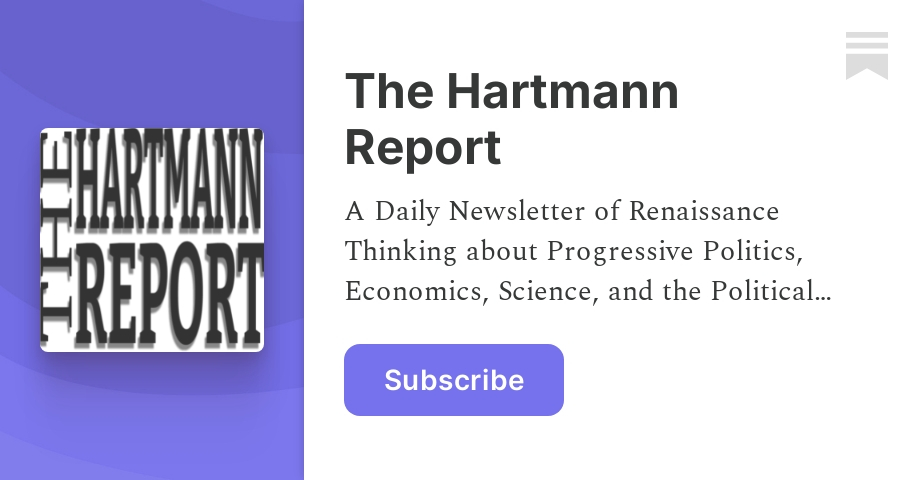
What the Science of Predators and Prey Tells Us About the Morbidly Rich and Working People
Nature and economics share some fascinating patterns, one of which explains why Donald Trump is about to become president and how the morbidly rich have appropriated over $50 trillion from working class people since the 1980s.
Last edited:

2016 ELECTION ATTACK: The Greatest Crime In American History
My first four investigations into 2016 US election interference by Russian military intelligence and the network of US white supremacists — central characters in the greatest crime in American history
Fascinating material with tragic consciences. thank you so for having shared it here.UNDERGROUND POLITICS :
A protagonist confesses that Reagan's campaign sabotaged Carter in the hostage crisis :
Ben Barnes, a prominent politician, reveals that he traveled to the Middle East to abort the so-called "October surprise" and that Iran would not release the kidnapped Americans until after the 1980 elections :

American Monsters: And Then There Were 13
A series about the network of US criminals accelerating global fascism

American Monsters: And Then There Were 13
A series about the network of US criminals accelerating global fascism


Eltitoguay
Well-known member

Deglobalization or struggle for world hegemony?
Understanding the extent of China's development as a power is essential to navigate the current architecture of world politics. This is the most relevant factor, along with the decline of American imperialism, to understand the earthquakes that are shaking international relations and their effects on the class struggle in all countries.
Juan Ignacio Ramos - Secretary General of the Revolutionary Left Economy November 11, 2023
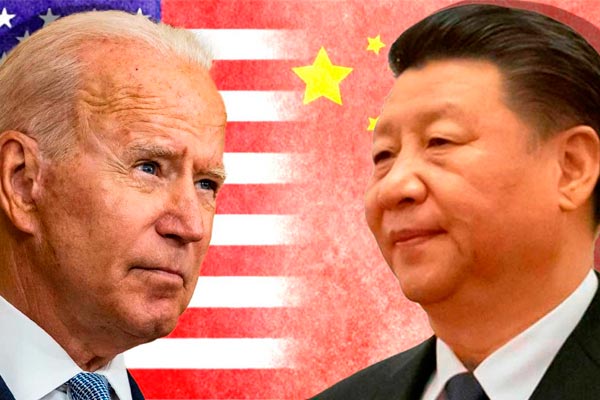
“Under capitalism, it is inconceivable that spheres of influence, interests, colonies, etc., should be divided up except by the power of those who participate in it – economic, financial, military, etc. – and the power of those who participate in the division changes unevenly, since the harmonious development of individual enterprises, trusts, branches of industry and countries is impossible under capitalism. Half a century ago, Germany was a mere trifle compared with Britain in terms of its capitalist strength… Is it conceivable that in ten or twenty years the balance of power between the imperialist powers will remain unchanged? It is absolutely inconceivable.”
"Imperialism, the highest stage of capitalism." ; Lenin
To disregard the colossal advance of productive forces in China in recent decades and the material basis it has provided to the state capitalist regime and its bourgeoisie to launch their imperialist agenda has little to do with Marxist theory. It is to deny one of the most salient laws of historical materialism: that of uneven development.
The Asian giant has rapidly completed stages that took other nations decades to complete. This progress has not only been quantitative, but qualitative, to the point of becoming a power capable of challenging the supremacy of the United States in decisive economic and geostrategic areas, and of disputing global governance with increasing success. While Washington has become a focus of permanent destabilization of international relations, Beijing attracts into its orbit numerous countries that not long ago were on the side of the American superpower.
State capitalism
We can point to three major turning points in the advance of Chinese capitalism: the Great Recession of 2008, the pandemic, and the imperialist war in Ukraine.
While the Western powers were sinking into a spiral of recession and stagnation, China took off in a big way in 2008. If that year its GDP was 4.5 trillion dollars, in 2012 it rose to 8 trillion and in 2022 to 17.1. In 2000, gross fixed capital formation was estimated at 400 billion dollars, but in 2018 it reached 5.7 trillion, surpassing the US figure.
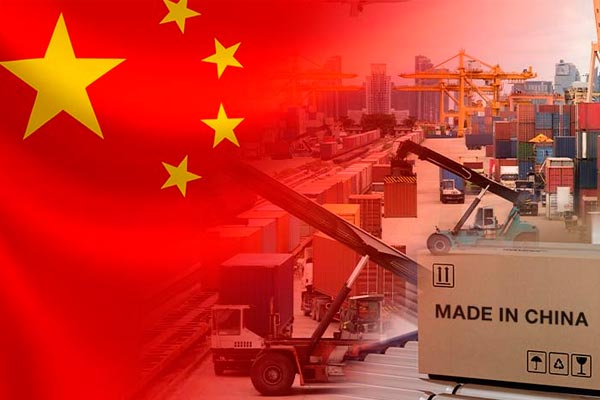
To disregard the colossal advance of productive forces in China in recent decades and the material basis it has provided to the state capitalist regime and its bourgeoisie to launch their imperialist agenda has little to do with Marxist theory.
China's contribution to global economic growth was 3.1% in 1978, 27.5% in 2018, and 33% in 2021 (source OECD). Although the US was still the largest economy in 2022 with 26.6% of global GDP, according to JP Morgan Economic Research, China closed the gap and reached 20.5%. The EU ranked third (16.8%) and Japan (5.7%) fourth.
As part of the campaign to discredit these advances, the Western press has been ridiculing the policies of the Xi Jinping regime for years and predicting all kinds of catastrophes. In May 2022, The Economist wrote about “the zero-Covid madness” that “is terrifying investors.” But reality has contradicted these predictions, as have the self-proclaimed Marxist theorists who echoed them. China has suffered a tiny number of deaths compared to those we suffer in the West and has maintained robust growth throughout this period.
In fact, Chinese exports remained buoyant throughout 2020, and that year laid the groundwork for the meteoric expansion of 2021, when its foreign sales grew by almost 30%. Between 2020 and 2022, the Chinese economy grew, in cumulative rates, almost nine points faster than the US economy. According to Bloomberg Economics, China's GDP growth this five-year period will be 22.6% compared to 11.3% in the US.
Inevitably, such an outcome has brought greater social and political stability to the Xi Jinping regime compared to the fractured and impoverished situation in American and European societies. It does not take a genius to understand that the sustained growth of production and exports is generating a larger internal market, and this has allowed the Chinese ruling class to make wage concessions far above those of other economies. According to the ILO, between 2008 and 2022, real wages for Chinese workers have almost tripled.
We point out these ideas not to sow illusions about Chinese capitalism, nor to hide the ruthless exploitation to which the working class is subjected, the absence of trade union and democratic freedoms, and the imperialist character of its state. We do so precisely to understand why the struggle between the US and China has reached the current critical point. The battle for hegemony between the two superpowers is the backdrop that explains the military and political conflicts that are unfolding before our eyes.
An upward dynamic
China is positioning itself in the sectors that will be most crucial to the capitalist mode of production in the coming decades. In 2022, Chinese car exports reached a record 3 million units, up 54.4% from 2021. The figures for 2023 are even better: in the first quarter, exports grew by 58.3% year-on-year, making it the world's largest car exporter after overtaking Japan.
In this sector, the electric car market is completely dominated, and industry and the State are working at a rapid pace to control the production of batteries and decisively increase their autonomy, as announced by the company Gotion High-Tech with the development of one that can travel 1,000 kilometers on a single charge.
The electric car is not something marginal; on the contrary, it is the symbol of the productive transition of the 21st century due to its powerful implications in all segments of the global economy.
Faced with this avalanche of bad news, the North American and European business press has launched the thesis that we are witnessing a “dangerous process of deglobalization and fragmentation of the world market.” But what is really happening is something else: the enormous difficulties in breaking away from an extremely globalized and interconnected economy is what fuels the conflict between the powers, and this conflict is increasing in force and significance as a change in the leadership of globalization is taking place.
We are witnessing once again, as in other historical junctures, the crisis of the national economy and a fierce battle between the great imperialist blocs that have been formed in the last ten years and that can only be resolved in the international arena through a fight to the death.
In "Imperialism", Lenin explains this dynamic:
“Finance capital and the trusts do not diminish, but increase the differences in the rate of growth of the different parts of the world economy. And once the balance of forces has changed, (...) what other means than war can there be under capitalism to eliminate the existing discrepancies between the development of productive forces and the accumulation of capital, on the one hand, and the division of colonies and the 'spheres of influence' among finance capital, on the other?”
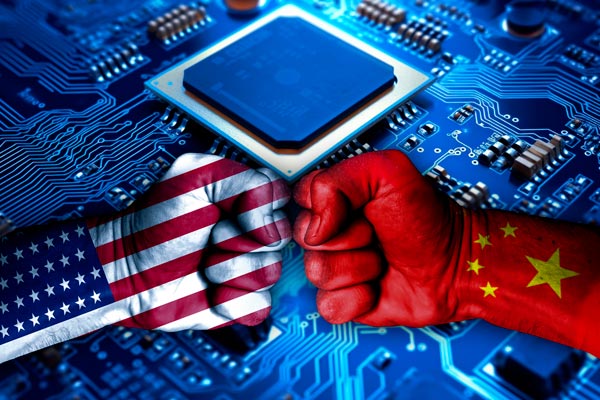
We are witnessing, as in other historical situations, the crisis of the national economy and a fierce fight to the death between the great imperialist blocs that have been formed in the last ten years.
Global production and supply chains are more extensive than ever, not to mention financial capital. The world economy is an overwhelming reality, but the problem is how its direction now points against the interests of Western imperialism. The central aspect is not the retreat of globalization, but the change of direction in this globalization, which is moving from the Western axis to that led by China. And the most striking thing is that although this new leadership is harmful to the West, no country can disengage due to the close relations that have been forged in recent decades.
Despite all the attempts to limit trade between the US and China, the tariffs approved by the Trump administration or a new phase in the trade war under Biden, the ties between the two economies have not weakened. Why is this happening? The answer is obvious: it is quite difficult to decouple from the country that is the world's leading exporter and second largest importer.
A study by Banco Santander (September 2023) provides the specific figures: “Considering the entire year 2022, China's trade surplus expanded by 31% annually, reaching $876.91 billion, the highest figure since records began in 1950, as exports increased by 7% and imports by only 1% (General Administration of Customs of China, 2023)” [1] .
In November 2020, China signed the Regional Comprehensive Economic Partnership with 14 other Indo-Pacific countries. The most comprehensive agreement in history, covering 30% of the world economy. Foreign Direct Investment (FDI) in China increased by 8% in 2022: “The manufacturing industry experienced a growth in FDI inflow of 46.1% year-on-year (…) that of high-tech industries by 28.3% compared to 2021. During this period, investment (…) from the European Union showed a sharp increase of 92.2% year-on-year.”
These figures are a slap in the face to the US strategy of trying to break economic and trade relations between Europe and China. The Asian giant's progress is so great that after the pandemic it became the world's main multilateral creditor, and although Beijing reduced its holdings of US bonds from more than a trillion to 800 billion dollars, the essential thing is that the mutual interdependence of both countries does not diminish.
The fears of US imperialism are well founded. According to the Australian Strategic Policy Institute, China leads research into the technology of the future. It outstrips the US and all other countries in research into 37 of 44 key technologies for innovation and growth. It is also ahead of the US in eight fields related to the energy industry.
The US still leads in supercomputers, next-generation processors and natural language processing (necessary for advances such as ChatGPT), but the gap is narrowing. China surpassed the US in annual patents for the first time in 2011. Ten years later, according to UN data, it already doubled the number of patents. It surpasses the US in robot density, leads in rare earth production and shapes US industry.
The fight between China and the US for control of strategic raw materials is a deadly one. The battle for dominance of the semiconductor market does not indicate a retreat from globalisation, but rather that control of this market will be decisive for technological and economic supremacy in the future.
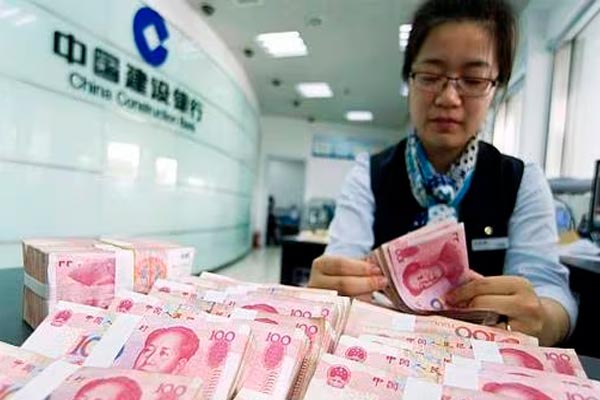
Chinese state capitalism has its problems, and they are not minor. To think that Chinese capitalism can overcome the contradictions inherent in the accumulation process is nonsense.
It is true that China is dependent on foreign technology, almost all of which is controlled by its geopolitical rivals: Taiwan, Japan, South Korea or the United States. But the Beijing regime has launched the Made in China 2025 plan to reduce chip imports from 85% (in 2015) to 30% in 2025.
The US's problems with the microchip market are also evident. And they are due to the close interrelation of this industry with the production that North American multinationals develop in China. Jensen Huang, CEO of Nvidia, the most valuable North American semiconductor company in the world, highlighted this in the Financial Times: "The Biden government's export restrictions leave the Californian firm with 'its hands tied', since it cannot market chips in one of the main markets. 'If China cannot buy from the United States, they will simply build it themselves. So the US has to be careful. China is a very important market for the technology industry (...) If they deprive us of the Chinese market (...) There is no other China'".
Chinese state capitalism has its problems, and they are not minor. China's total debt has reached unprecedented levels (295% of GDP). The real estate bubble is also spreading like an oil slick, leading to multi-million-dollar bankruptcies, the most notable case being Evergrande. Without a doubt, one of the great structural imbalances is that a very important part of this real estate activity has been financed with debt from local and municipal governments - which are supplied by shadow banking, the deregulated financial sector - and which reaches three trillion dollars. It seems crazy, but if we compare it with what this sector moves in the US and Europe, it is the West that has a ten times bigger problem.
But, above all, its export dependence on countries that are in a situation of recession and stagnation (Germany, the USA, Italy, etc.) adds uncertainty. Hence the enormous diversification of Chinese investments and the search for new markets for raw materials, agro-food production, mining, etc. in Africa, Latin America and Asia.
To think that Chinese capitalism can overcome the contradictions inherent in the accumulation process is nonsense .
Crisis cíclicas - Wikipedia, la enciclopedia libre
es.wikipedia.org
What we want to do is to situate the context in which the Chinese economy operates, its strengths compared to its competitors and the qualitative advantages enjoyed, even if only temporarily, by its state capitalist regime.
It has not yet replaced the US as the dominant imperialist superpower, but the war has already begun.
US imperialism has strong points in its favour. The dollar is hegemonic: it is involved in almost 90% of transactions and represents almost 60% of central banks' foreign exchange reserves (70% in 1999), but there are plans and trade agreements between China and quite a few countries, including some important former allies of the US, to change this trend. The volume is still modest, but the situation may accelerate as it has already happened in other fields.
Understanding the extent of China's development as a power is essential to navigate the current architecture of world politics. This is the most relevant factor, along with the decline of American imperialism, to understand the earthquakes that are shaking international relations and their effects on the class struggle in all countries.
[1] Foreign trade figures in China

¿Desglobalización o lucha por la hegemonía mundial?
www.izquierdarevolucionaria.net
Eltitoguay
Well-known member
Error.
Last edited:

‘We have been heard’: Montana youth score a major climate victory in court
In a 6-1 ruling, the Montana Supreme Court affirmed their constitutional right to a “clean and healthful environment” in a key climate case.
"we don't inherit the earth from our parents, we borrow it from our children"
‘We have been heard’: Montana youth score a major climate victory in court
In a 6-1 ruling, the Montana Supreme Court affirmed their constitutional right to a “clean and healthful environment” in a key climate case.grist.org
Has a ring of truth to it that leaves me feeling less than comforted."we don't inherit the earth from our parents, we borrow it from our children."
Would imagine that going forward, this generation will be credited with decisions that were made in the era of our grandparents.


